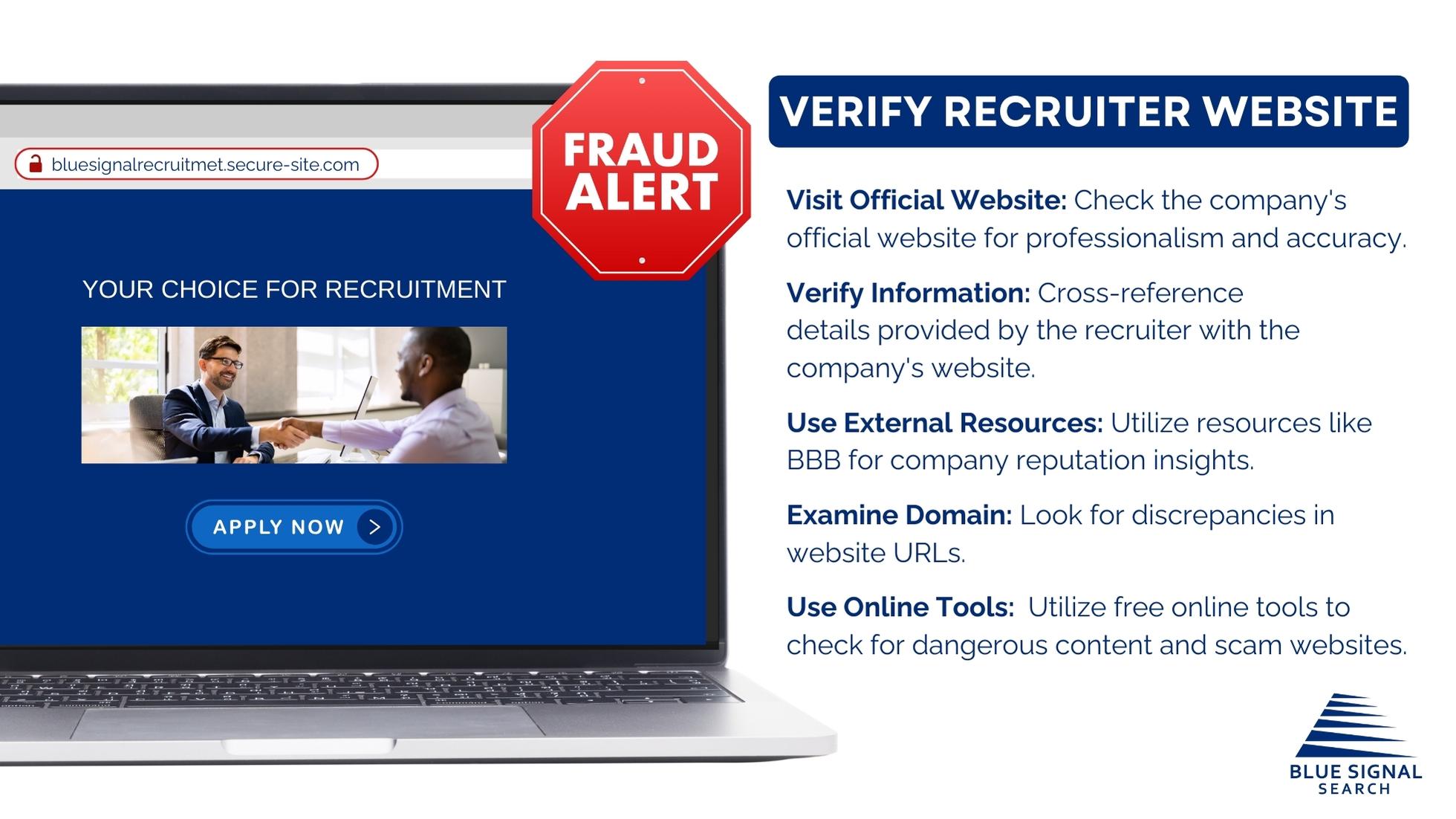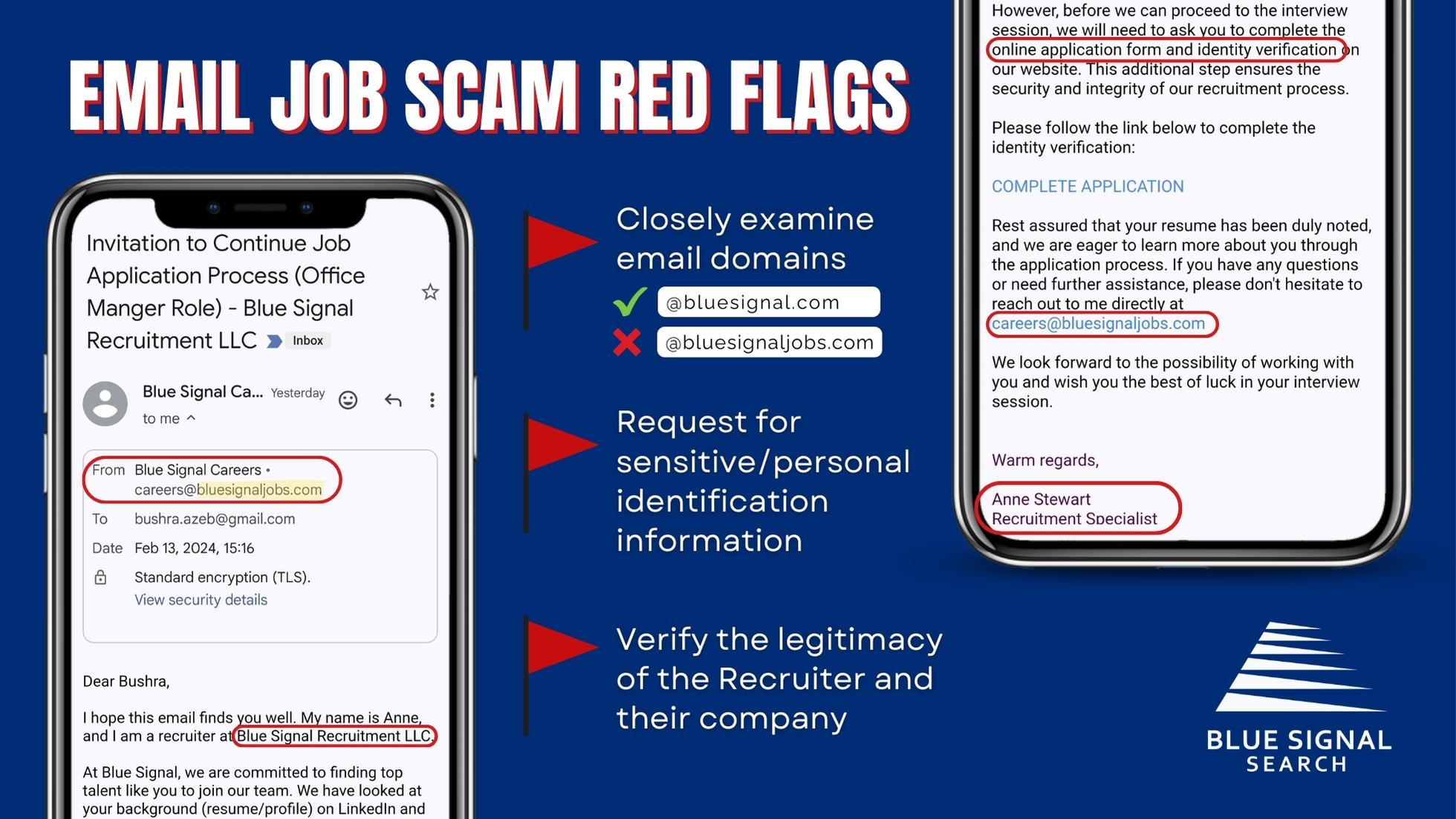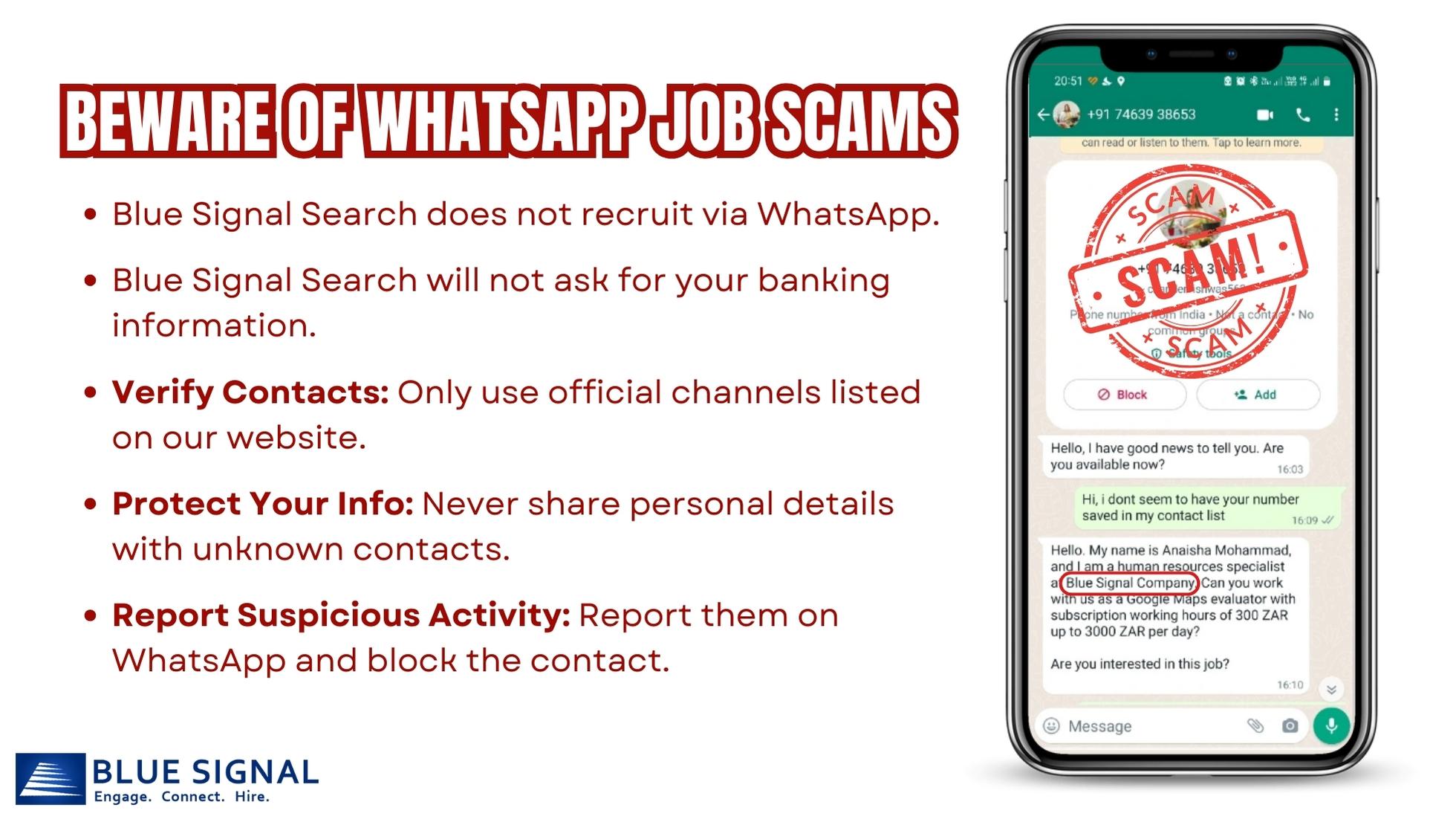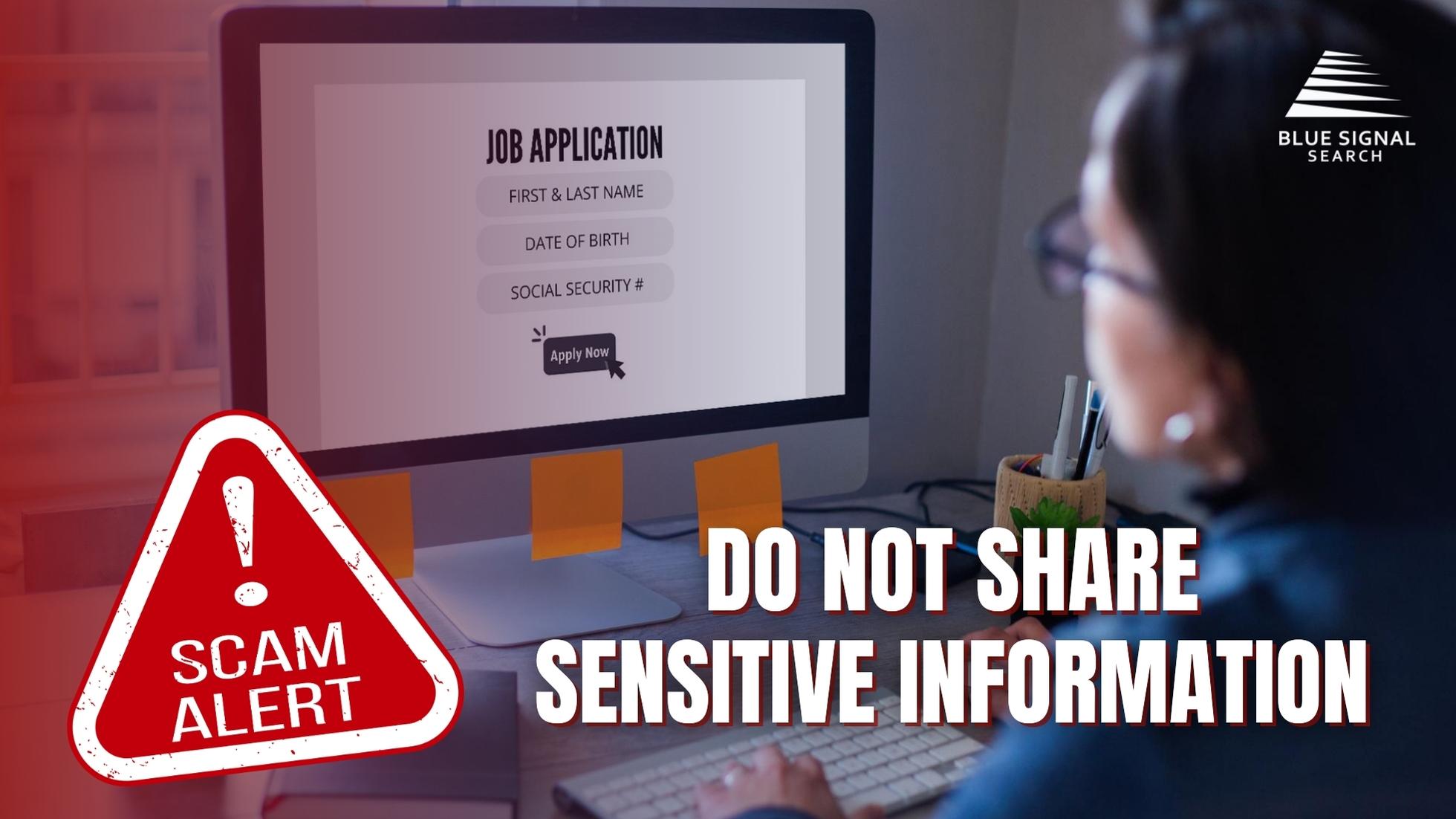Today, we're diving into an increasingly pressing issue: the surge of fake recruiters and job scams lurking in the online job market. Picture this: you're scrolling through your favorite job platform, excitedly hunting for your next career move, when suddenly, you stumble upon what seems like the perfect opportunity. But hold on just a second! Did you know that behind those seemingly enticing job listings could be cunning scammers waiting to pounce?
According to a recent article from the Federal Trade Commission (FTC), job scams are on the rise, with scammers upping their game lately to trick unsuspecting job seekers. Additionally, job seekers should be cautious of the various types of job scams, as highlighted in this detailed article from Indeed. At Blue Signal, we've recently witnessed the dangers of these schemes firsthand. From impersonating our recruiters on WhatsApp to crafting counterfeit websites that look all too real, these scammers stop at nothing to get their hands on your sensitive info.
But fear not! To combat this threat, we're here to arm our community with the knowledge needed to identify and avoid falling victim to fake recruiters. Here's a comprehensive guide to help you spot these job scams and safeguard your personal information.
How to Spot Fake Recruiters:
When navigating the job market, it's essential to be vigilant and recognize the signs of fake recruiters. Here are some key strategies to help you protect yourself:
1. Verify the Company
Before engaging with a recruiter, it's crucial to verify the legitimacy of the company they claim to represent. Start by visiting the company's official website. Look for signs of professionalism, such as a well-designed layout, clear contact information, and detailed descriptions of their products or services. A legitimate company invests in maintaining a credible online presence.
Next, cross-reference the information provided by the recruiter with the details available on the company's website. Pay attention to discrepancies or inconsistencies in job descriptions, company history, or contact details. If something doesn't add up, it could be a red flag indicating a potential scam.

But don't stop there! Take your investigation a step further by leveraging external resources. Websites like the Better Business Bureau (BBB) or the Chamber of Commerce offer valuable insights into a company's reputation and standing within the industry. Look for any complaints, reviews, or accreditation status that could signal whether the company is trustworthy. Additionally, consider using free online tools to check the legitimacy of the company's website. Tools like Google Transparency Report, URLVoid, or Aura's safe browsing tools can scan websites for dangerous content and warn you before entering a potentially fake site.
Remember, verifying the legitimacy of a company is your first line of defense against falling victim to job scams perpetrated by fake recruiters. This step can help you confirm whether the recruiter is genuine or potentially fraudulent.
2. Check Email Addresses and Domains
Spotting fake recruiters requires a keen eye for detail, especially when it comes to scrutinizing email addresses and domains. Fraudulent recruiters often use email addresses and domains that closely resemble those of reputable companies, hoping to trick unsuspecting job seekers. Be vigilant for subtle discrepancies like misspellings or extra characters in email addresses or website URLs. These small variations could be telltale signs of a cybersecurity threat in the making.
Additionally, consider the domain extension used in the email address. Legitimate companies typically use professional domain extensions like .com, .org, or .net. Be wary of email addresses with unusual or uncommon domain extensions, as they could indicate a fraudulent attempt.

One effective way to verify the authenticity of an email address is by using an email verifier tool. These tools analyze email addresses and provide insights into their validity and legitimacy. We recommend using the free email verifier tool provided by Mailmeteor or IPQualityScore. This tool helps you verify email addresses quickly and accurately, giving you peace of mind in your job search endeavors. By taking these proactive measures to scrutinize email addresses and domains, you can protect yourself from falling prey to fake recruiters.
3. Be Wary of Unsolicited Messages
Receiving an unexpected message from a recruiter can be both exciting and concerning. While it's not uncommon for recruiters to proactively seek out potential candidates, it's essential to exercise caution when dealing with unsolicited messages. Legitimate recruiters will typically provide specific details about the job opportunity, including the company name, job title, and relevant qualifications. Be wary of generic messages lacking personalized information or those that seem too good to be true.
Take the time to verify the recruiter's identity before responding to their message. Look for clues such as a professional LinkedIn profile or a legitimate company email address. If possible, reach out to the company directly to confirm the recruiter's affiliation and the authenticity of the job offer. By remaining cautious and trusting your instincts, you can better protect yourself from falling victim to unsolicited messages from fake recruiters. Remember, your safety and security are paramount, so don't hesitate to take the necessary precautions when dealing with unfamiliar communications.
4. Unofficial Communication Channels
Be cautious if a recruiter contacts you through unofficial channels like WhatsApp or other non-traditional platforms. According to a recent article from MalwareTips, job seekers should be particularly wary of unofficial communication channels, such as WhatsApp, which have become targets for scams targeting unsuspecting individuals.
In addition to WhatsApp, scammers may also attempt to reach out through other non-traditional platforms such as social media messaging apps, online forums, or personal email accounts. These channels may lack the security measures and verification processes found in official communication channels used by legitimate recruiters.

At Blue Signal, we prioritize the security and privacy of our candidates. Recently, we've encountered WhatsApp scams posing as Blue Signal recruiters. If you encounter suspicious activity, report it on WhatsApp and block the contact using the instructions provided here. If a recruiter insists on communicating through channels outside of the norm, it's essential to question their legitimacy and take extra precautions to protect your personal information from falling into the hands of fake recruiters.
5. Request for Personal Information
One of the most significant red flags of a fake recruiter is a request for sensitive personal information, such as your Social Security number or banking details, upfront. While legitimate recruiters understand the importance of privacy and adhere to strict protocols, scammers may attempt to exploit unsuspecting job seekers by soliciting sensitive details prematurely.
In addition to traditional identifiers like Social Security numbers and banking information, be cautious of requests for other sensitive data, including copies of identification documents or passwords. These requests, especially when made early in the recruitment process, should raise immediate suspicion. Remember, reputable recruiters prioritize building trust and establishing rapport before broaching sensitive topics.
If you encounter a recruiter asking for sensitive information prematurely, proceed with caution and consider reporting the incident to the appropriate authorities or platform administrators. Trust your instincts and prioritize your privacy—legitimate opportunities will never require you to compromise your security for consideration.

Responding to Suspicious Activity:
If you encounter suspicious recruitment activities, it's essential to take action promptly. Here's what you can do:
Report Fake Recruiters and Job Scams
If you come across a suspected fake recruiter or believe you've been targeted by a job scam, report it immediately. Platforms like LinkedIn and job search websites offer mechanisms to report fraudulent activity and safeguard users from scams. You can report suspicious activity on LinkedIn here. Additionally, consider blocking the contact to prevent further communication.
If you see a job scam, or lose money to one, report it to the FTC at ReportFraud.ftc.gov. You can also report it to your state attorney general at the link here.
We encourage our Blue Signal community to report any suspicious activity to help us maintain a safe environment for all job seekers. If you've encountered a recruiter posing as a Blue Signal representative, please don't hesitate to contact us. By promptly reporting suspicious activity, you not only protect yourself but also contribute to fostering a secure job search environment for everyone.
Blue Signal’s Commitment to Safety and Security

At Blue Signal, we take the safety, privacy. and security of our community seriously. We're actively monitoring and addressing these scams to ensure a safe job search experience for everyone. Our dedicated team investigates reported incidents and takes appropriate action to protect candidates and clients from fraudulent activities. Your trust is our top priority, and we're committed to maintaining a secure environment for your job search journey.
Conclusion
Protecting yourself from fake recruiters requires awareness, vigilance, and proactive measures. By following the guidelines outlined in this guide and staying informed about common scam tactics, you can safeguard your personal information and avoid falling victim to fraudulent schemes. Remember, if you ever encounter suspicious activity, don't hesitate to reach out to us directly. Together, we can combat these scams and protect each other from harm.
Partner with Blue Signal Search
If you're in need of professional recruitment services or seeking job opportunities, reach out to Blue Signal today. We're here to assist you in finding the right fit for your career goals while ensuring a safe and secure job search experience. Don't let fake recruiters deter you from pursuing your dreams—let us help you navigate the job market with confidence.
Partner with us for your next hire.
Set up a free consultation with a recruiting manager. Tell us about your hiring need.
By submitting this form, you consent to receive communications from Blue Signal, including phone calls, emails, and text messages.
